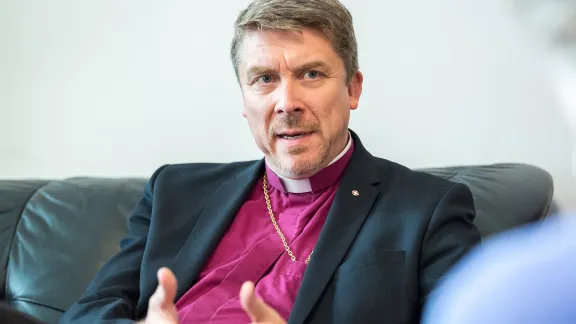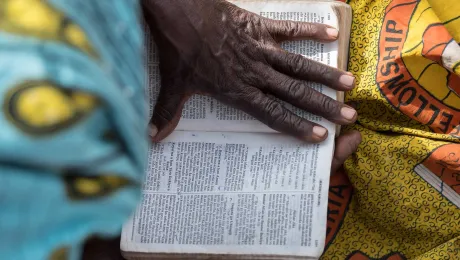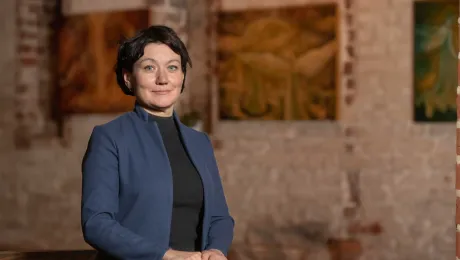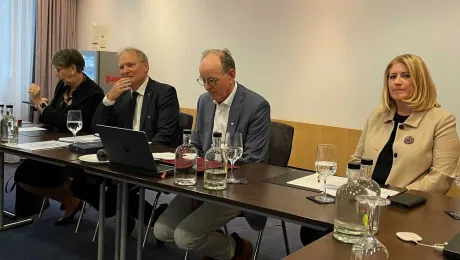
Archbishop Urmas Viilma, head of the Estonian Evangelical Lutheran Church Photo: LWF/A. Hillert
Archbishop Urmas Viilma says churches in the region must pray for Ukraine and proclaim gospel of peace at all times
(LWI) - Responding to the Russian attacks in Ukraine, churches in the region are called to stand up for peace, condemning war and violence, but also ensuring there is no backlash against the large Russian populations living in their countries. The Lutheran World Federation (LWF) vice-president for the Central Eastern European region, Estonian Archbishop Urmas Viilma, says “the mission of the church is to pray, to commemorate the victims of war and to proclaim the gospel of peace at all times.”
As the Russian military began its assault on cities in eastern Ukraine early on 24 February, Estonians were celebrating their national independence day. A week earlier, the ten-member Estonian Council of Churches had already issued a statement of concern about Russian troops gathering close to the Ukrainian border. “In a way, we were prepared for this, as we had been following the tensions of the past eight years,” Archbishop Viilma says, “but nobody wanted to believe it would happen.”
The following day, the archbishop urged people in Estonia to pray for an end to the conflict and to send donations directly to the church in Ukraine that had already begun supporting those fleeing from the violence. On 26 February, he held a service in Tallinn’s largest Lutheran church, condemning Russia’s actions and calling for bells to ring throughout the country the following week to remember the victims of the war. On 1 March, the Consistory of the Estonian Evangelical Lutheran Church (EELC) also condemned the Russian invasion and called on people to give generously to four humanitarian organizations including the Red Cross and the LWF’s emergency fund.
Practical and psychological support
Meanwhile, the EELC’s diaconal arm began partnering with the Estonian government to roll out support for refugees and to map all the churches in the country that are able to welcome people into their congregations. As of 9 March, 10,000 refugees had arrived in Estonia, five times the number that the government initially predicted. Some are in transit to Sweden or Finland, while the majority of those who remain are women and children in need of both practical and psychological support. Members of the ecumenical chaplaincy team are travelling to and from the Polish-Ukrainian border doing what they can to provide pastoral and spiritual care for those escaping from the conflict.
Lutheran congregations have offered hospitality for 500 of the refugees, as well as supporting the response of other humanitarian organizations. “Compared to the million and a half refugees that Poland has already taken in, this is a small number that Estonia has received,” Viilma says, “but we are a small country with just 1.3 million people.” Talking with bishops in the region, he says, “we are aware we must also be prepared for the long term. At the moment there is an emotional reaction and everybody wants to help, but even if the war stops now, Ukraine will need rebuilding and we must plan for that too.”

Churches in Poland and other countries neighboring on Ukraine are responding to over two and a half million refugees who have fled from the conflict. Photo: Filip Błażejowski
Sharing conversations with church leaders in Latvia, Archbishop Janis Vanags, and Lithuania, Bishop Mindaugas Sabutis, Viilma notes that all three Baltic states have large numbers of Russian citizens and Russian-speaking people living within their borders. A recent survey said more than 30 percent of those living close to the eastern border with Russia are supportive of the war, which is “very, very alarming,” he says. Last week, the Estonian government decided to shut down all Russian media channels in the country, but tensions are high, he adds.
“I have not heard about any violence against Russians,” Viilma continues, “but the secular media is expecting our Estonia Council of Churches to erase the Russian Orthodox Church by pushing them out and this is not acceptable. We have always had good cooperation with them, but people are expecting local metropolitans to distance themselves from the statements of the Moscow Patriarch Kirill,” he says.
On the one hand, we need to condemn Putin’s actions and the violence against the Ukrainian people, but on the other we need to ensure there is no rioting against the Russian speaking people in our societies.
The church, especially in the Baltic context, needs to be “a balancing power in a very difficult situation,” the archbishop insists. “On the one hand, we need to condemn Putin’s actions and the violence against the Ukrainian people, but on the other we need to ensure there is no rioting against the Russian speaking people in our societies. We can be critical, but we cannot make more tensions or erase people and the church is made up of people.”
“We need to stand for peace always,” Viilma concludes, noting that the Ukrainian conflict has been on the horizon for a long time. “There are always attacks and wars and violence against groups or countries or faith communities, but if they are very far away from us, we really do not notice them so much. But we need to be aware that they could come to our streets, our homes, our neighbors’ yards and that is why we must be peace makers and peace seekers all the time,” he says.
LWF/P. Hitchen
LWF's is coordinating a response through its member churches in Ukraine and the neighboring countries to ensure support to Ukrainian refugees as well as their safe and dignified arrival. The work is supported by LWF's funding partners, including the Evangelical Lutheran Church in America.


